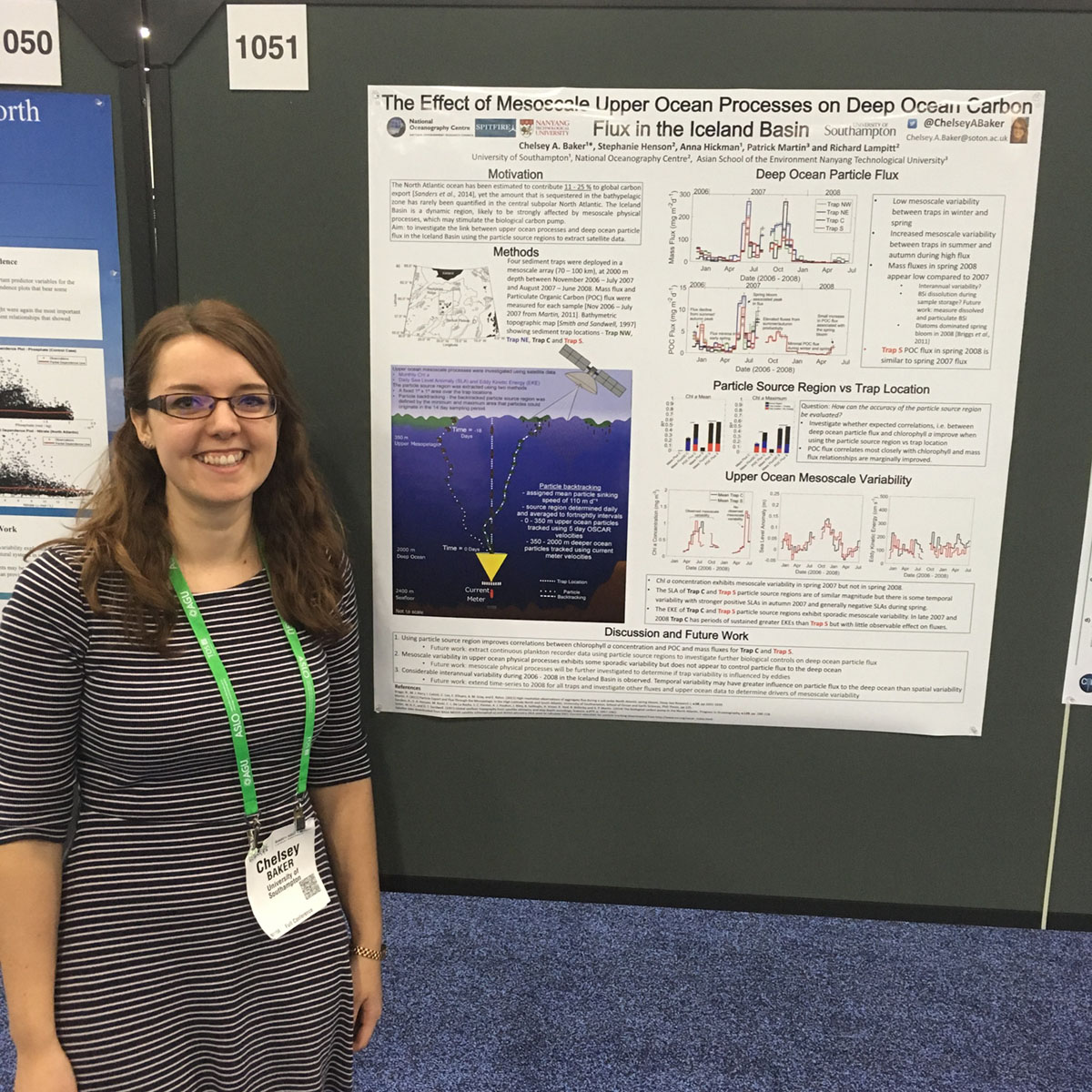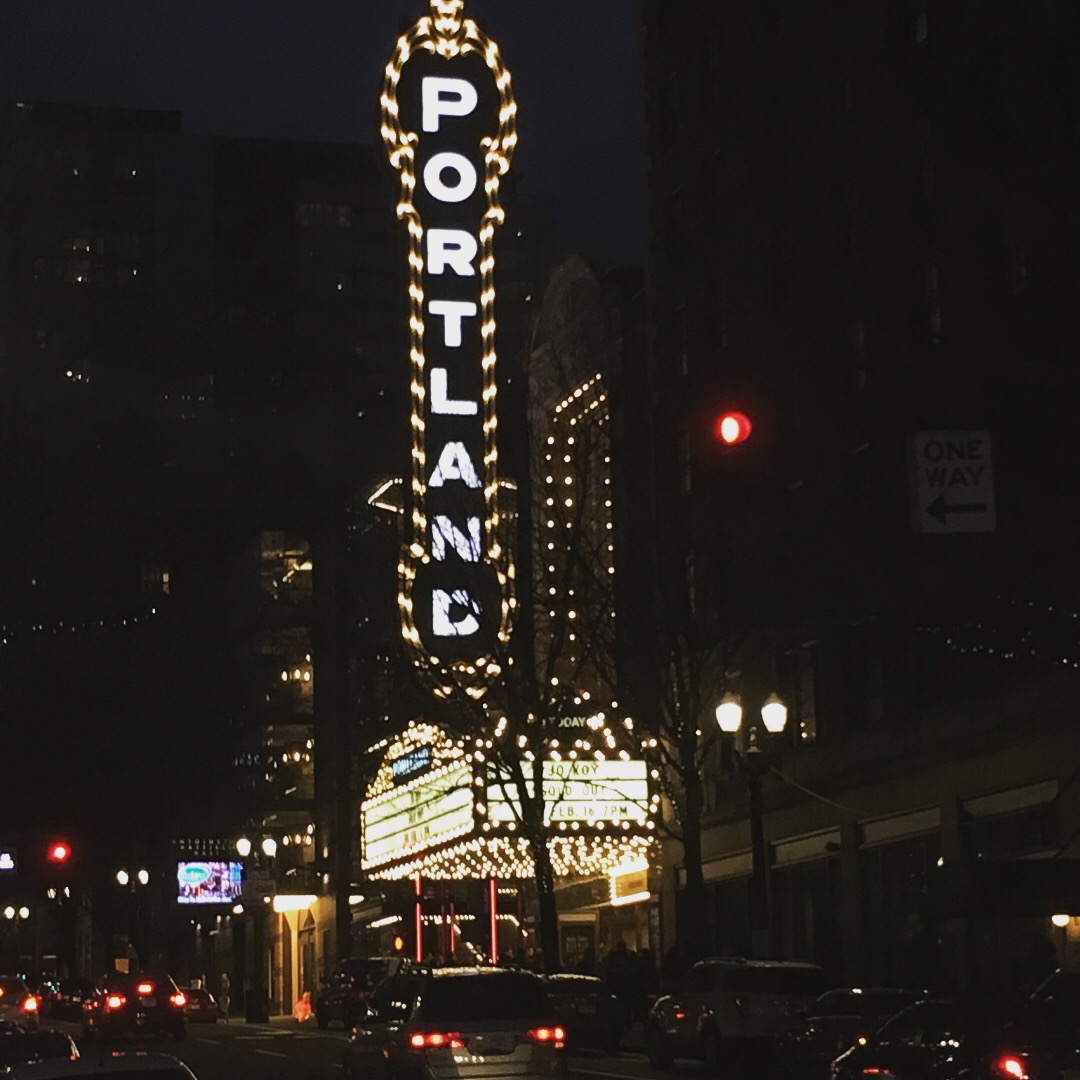Ocean Sciences: 2018 Portland Oregon
Chelsey Baker
NOC, Southampton
I was awarded a travel grant by the Challenger Society to attend the Ocean Sciences 2018 conference in Portland, Oregon. This was the first international conference I have attended with over 5000 attendees and more than 400 sessions.
On Sunday, before the official kick off of the conference, I attended a Science Communication workshop run by an actor and improv instructor. The workshop was interactive and helped develop our skills of forming a narrative and understanding the art of continuing a discussion using "Yes and" . It was a very fun session that pushed everyone outside of their comfort zone and was a great way to start the conference.
On Monday I attended the first of many sessions on the Biological Carbon Pump and presented my PhD research during the poster session. My research focuses on deep ocean particle flux in the Iceland Basin and how upper ocean mesoscale processes may exhibit some control on the material that reaches the deep ocean. I enjoyed presenting my poster, and had many interesting conversations about my work, which generated new ideas and areas to further explore. Attending the conference also allowed me to meet a co-author in person and discuss my PhD research face-to-face.  The conference passed in a busy and exciting blur of talks, networking at poster sessions and exploring Portland in the evening. One of the standout moments were the plenary talks on Tuesday by Prof. Claudia R Benitez-Nelson and Prof. John Dabiri. Claudia gave the most engaging research talk I’ve ever seen, with a strong narrative discussing Phosphorus cycling that really connected with the audience. John then followed with another inspiring talk full of amazing videos of swimming animals demonstrating how much energy they contribute to ocean mixing and his rapid career path to Professorship was very impressive. I definitely felt inspired and raring to get back to my PhD after those talks.
The conference passed in a busy and exciting blur of talks, networking at poster sessions and exploring Portland in the evening. One of the standout moments were the plenary talks on Tuesday by Prof. Claudia R Benitez-Nelson and Prof. John Dabiri. Claudia gave the most engaging research talk I’ve ever seen, with a strong narrative discussing Phosphorus cycling that really connected with the audience. John then followed with another inspiring talk full of amazing videos of swimming animals demonstrating how much energy they contribute to ocean mixing and his rapid career path to Professorship was very impressive. I definitely felt inspired and raring to get back to my PhD after those talks.
I would like to thank the Challenger Society for awarding me this travel grant that allowed me to attend this conference, learn about new research in my field and network within the wider oceanography community. It also allowed me to catch up with my peers who live all around the world and even to spend Wednesday evening watching the Portland Trailblazers win an NBA game. I’m glad that Ocean Science 2018 was the first international conference I attended as it was a truly amazing experience and I left feeling inspired, motivated and very grateful for the opportunity.
Profile: Chelsey Baker is a 3rd year PhD student at the National Oceanography Centre in Southampton researching the biological carbon pump. Chelsey is currently undertaking a research placement at Woods Hole Oceanographic Institute.
Twitter post: A blog post about Ocean Sciences 2018 – my first international conference by @ChelseyABaker #OSM18
Latest News
Marine Data Management, Governance and the MEDIN toolset
The Marine Environmental Data and Information Network (MEDIN) and OceanWise are delighted to invite you to attend our popular free online training workshop: ‘Marine Data Management, Governance and the MEDIN toolset’ on the 19th – 23rd of May 2025.
Workshop on the contribution of UK Arctic Ocean science to the International Polar Year 32/33
12:00 11th June – 16:00 12th June 2025: NOC Southampton (In-person with online option): Registration deadline 16th May
REGISTER HERE
Pre-meeting questionnaire (open to all)
The purpose of this workshop is for the UK Ocean Science community to discuss and then draft a prospectus document outlining the priority Arctic research questions the community would like to address during the run up to, throughout and beyond the International Polar Year 32/33. Additionally, to identify what unique strengths and technologies the UK has to help fill these knowledge gaps.
The second day of the workshop will be dedicated to writing groups, one for each of the priority research questions identified - from both the pre-meeting questionnaire (HERE) and day one discussion. By the end of the meeting, each group will have produced draft text and sourced supporting figures for the prospectus.
Post meeting, the draft will be opened for comments and suggestions from everyone, regardless of whether they were able to attend the workshop or not. It will then be shared with UK funders (UKRI, FCDO, DSIT, ARIA) and potential international programmes with whom we would like to collaborate (e.g. Arctic 2050, Norway). It will form a basis from which wider integration with terrestrial, atmospheric and cryosphere communities can be built, e.g. at the UK Arctic Science Meeting in September in Northumbria.
To ensure balanced community and ECR representation, and to ensure that the size of the writing groups is efficient and effective, if the number of registrations from individual institutes becomes overwhelming, we may contact individuals or teams and ask that each institute selects a smaller number of individuals to attend in-person. Please wait for confirmation of in-person attendance before finalising travel arrangements.
The workshop will be open to hybrid attendance and contributions on both days.
Challenger Society Council Position Vacancy
The Challenger Society for Marine Science (CSMS) are pleased to announce an exciting opportunity to support the next generation of ocean scientists and innovators. CSMS are looking for a new Council member to fill the Student Travel Awards and Stepping Stones Portfolio. The successful applicant will administer the travel and research grants available for Early Career Researchers.
The role involves:
- Receiving applications for the two schemes and responding to applicant inquiries
- Soliciting and compiling input from the rest of the Council for assessing the applications
- Communicating with successful and unsuccessful applicants for the two schemes
- Working with the Honorary Treasurer on allocating funds to successful applicants
- Following up with award winners on their reporting requirements
- Attending Council meetings four times a year (in person or online) and contributing to discussions and decision making for CSMS
The usual term for Council members is three years.
For more information about the CSMS Council, please follow this link: https://www.challenger-society.org.uk/The_Council
For more information about our Early Career Researcher grants and awards, please follow this link:
https://www.challenger-society.org.uk/Stepping_Stones
and
https://www.challenger-society.org.uk/Travel_awards
If you are interested in applying or have any questions regarding the role, please contact kathen@bas.ac.uk

